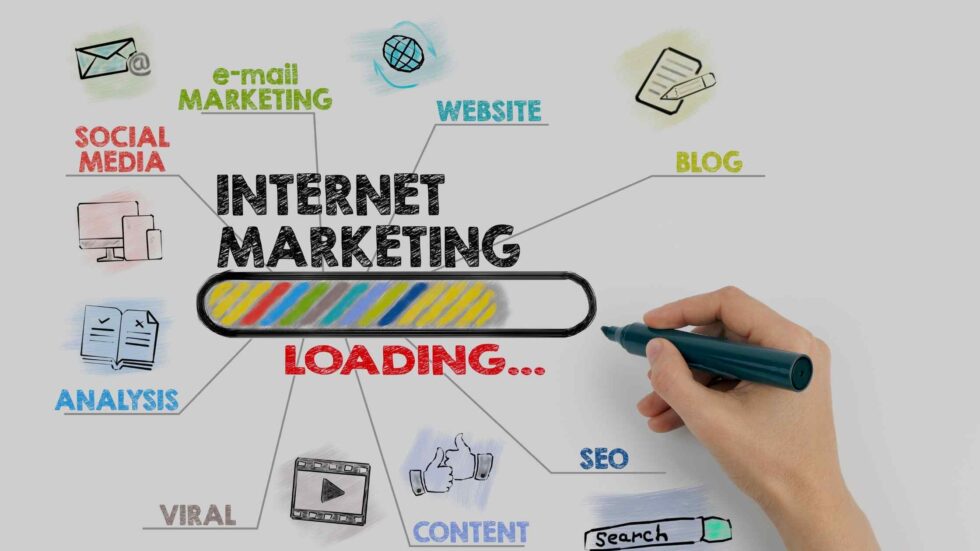
Welcome to our blog post on How to Start Online Marketing. Whether you’re a small business owner, an aspiring entrepreneur, or simply curious about the world of digital marketing, this guide is for you. In today’s digital age, establishing a strong online presence is essential for success. In this post, we will explore the fundamentals of online marketing and provide you with actionable tips to get started. So, let’s dive in and learn how to harness the power of online marketing to reach your goals.
How to Start Online Marketing
What is Online Marketing?
Online marketing, also known as internet marketing or digital marketing, refers to the utilization of various digital channels and platforms to promote products, services, or brands to a targeted audience. It encompasses a broad spectrum of strategies and tactics designed to enhance visibility, engage potential customers, and generate leads or sales.
Benefits of Online Marketing
- Increased Visibility: Online marketing facilitates the exposure of businesses to a global audience. Through optimized online presence, companies can enhance their visibility, making it easier for potential customers to discover their offerings.
- Targeted Audience: Unlike traditional marketing methods, online marketing enables precise targeting of specific demographics, interests, or behaviors. This precision ensures that marketing efforts reach the most relevant audience, thereby increasing the likelihood of conversions.
- Cost-Effectiveness: Compared to traditional advertising, online marketing often proves to be more cost-effective. With options like pay-per-click (PPC) advertising, businesses can allocate their budget more efficiently, targeting audiences likely to convert while minimizing unnecessary expenses.

Setting Goals for your Online Marketing Strategy
Defining Objectives: Before diving into an online marketing campaign, it’s essential to establish clear and achievable objectives. Whether it’s increasing website traffic, boosting sales, or improving brand awareness, defining specific goals sets the foundation for a focused strategy. Identifying Target Market: Understanding the target market is pivotal. Conducting thorough market research helps in identifying the demographics, preferences, and behaviors of the audience. This knowledge enables tailored marketing campaigns that resonate with the intended consumer base. Establishing Key Performance Indicators (KPIs): KPIs serve as measurable metrics that gauge the success of online marketing efforts. Metrics like conversion rates, click-through rates (CTR), and return on investment (ROI) help in evaluating the effectiveness of campaigns and making data-driven decisions.
Research and Analysis
Understanding Industry Trends: Staying abreast of industry trends is crucial for devising a competitive online marketing strategy. Monitoring industry developments, consumer behavior shifts, and emerging technologies ensures adaptability and relevance in the market.
Competitor Analysis: Analyzing competitors provides valuable insights into their strategies, strengths, and weaknesses. This analysis aids in identifying opportunities for differentiation and improvement, allowing businesses to carve out their unique position in the market.
Target Audience Research: Comprehensive research on the target audience encompasses factors like demographics, psychographics, and purchasing behavior. This data guides the customization of marketing messages, content, and strategies tailored to resonate with the intended audience.
Choosing the Right Online Marketing Channels
Leveraging Search Engine Optimization (SEO)
Search Engine Optimization (SEO) is an indispensable component of successful online marketing. It involves optimizing your website and its content to rank higher in search engine results pages (SERPs). Effective SEO strategies encompass various elements:
- Keyword Research and Implementation: Conduct thorough keyword research to identify relevant terms and phrases used by your target audience. Integrate these keywords naturally into your website content, including titles, meta descriptions, headings, and body text, to improve visibility for specific search queries.
- On-Page Optimization: Enhance the technical aspects of your website, such as improving site speed, optimizing images, ensuring mobile-friendliness, and creating a user-friendly experience. Structuring content with appropriate headings, bullet points, and relevant multimedia elements improves readability and user engagement.
- Link Building: Acquiring high-quality backlinks from reputable websites is essential for improving your site’s authority and credibility. Focus on obtaining links from industry-related websites or authoritative sources, as this can significantly impact your search rankings.
- Content Creation: Develop informative, engaging, and original content that adds value to your audience. Regularly publishing high-quality blog posts, articles, infographics, videos, and other forms of content not only attracts visitors but also encourages sharing and linking, contributing to improved SEO performance.
Harnessing the Power of Social Media Marketing
Social media platforms offer an extensive reach and engagement opportunities for businesses. Here’s how to maximize social media marketing:
- Platform Selection: Choose social media platforms aligned with your target audience. For instance, if your business caters primarily to professionals or B2B customers, LinkedIn might be more effective than platforms like Instagram or TikTok.
- Content Strategy: Craft diverse content tailored to each platform’s unique features. Utilize a mix of visuals, videos, user-generated content, polls, stories, and live streams to maintain audience interest and engagement.
- Community Engagement: Actively engage with your audience by responding to comments, messages, and inquiries promptly. Encourage user-generated content, run contests, and foster a sense of community to enhance brand loyalty and advocacy.
- Paid Advertising: Utilize paid advertising options offered by social media platforms to target specific demographics, interests, and behaviors. These targeted ads can significantly boost visibility and conversions.

Email Marketing Strategies for Success
Email marketing remains a potent tool for nurturing leads, driving conversions, and maintaining customer relationships. Key strategies include:
- Segmentation and Personalization: Divide your email list into segments based on demographics, purchase history, or engagement levels. Craft personalized and targeted emails that resonate with each segment, increasing relevance and engagement.
- Automation and Drip Campaigns: Implement automated email sequences or drip campaigns that deliver relevant content and offers based on subscriber actions or predefined triggers. This helps in nurturing leads through the sales funnel systematically.
- Compelling Content and Call-to-Actions (CTAs): Create compelling subject lines and content that entices recipients to open your emails. Clear and persuasive CTAs guide subscribers towards desired actions, such as making a purchase or visiting your website.
- Analytics and Optimization: Monitor email performance metrics like open rates, click-through rates, and conversions. Use this data to refine your email strategies, testing different elements (subject lines, content, CTAs) to optimize performance continually.
Content Marketing Strategies Driving Results
Content marketing plays a pivotal role in building brand authority and establishing trust with your audience. Key strategies include:
- Content Planning and Calendar: Develop a content calendar that aligns with your overall marketing objectives. This calendar should outline topics, formats, publishing schedules, and promotion strategies for various content pieces.
- Quality and Relevance: Focus on creating valuable, informative, and engaging content that addresses the needs, pain points, or interests of your target audience. Quality content not only attracts visitors but also encourages repeat visits and sharing.
- Diverse Content Formats: Experiment with diverse content formats such as blog posts, ebooks, whitepapers, podcasts, webinars, videos, and interactive content. Tailor content formats based on audience preferences and consumption habits.
- Content Distribution and Promotion: Don’t just create content; actively promote it across multiple channels. Utilize social media, email newsletters, influencer partnerships, guest posting, and SEO strategies to amplify your content’s reach and impact.
Creating a Comprehensive Online Marketing Plan
Integrating these various strategies into a cohesive marketing plan involves:
- Defining Clear Objectives: Align your online marketing efforts with specific, measurable, achievable, relevant, and time-bound (SMART) goals. These objectives should be the driving force behind your entire marketing plan.
- Budget Allocation: Allocate your marketing budget wisely across different channels and strategies. Experimentation and testing can help determine which channels provide the best return on investment (ROI) for your business.
- Regular Monitoring and Optimization: Continuously monitor performance metrics across all marketing channels. Analyze data, identify trends, and make data-driven decisions to optimize campaigns for better results.
- Flexibility and Adaptability: The digital landscape evolves rapidly. Stay adaptable and open to changes, adjusting strategies based on market shifts, emerging trends, or shifts in consumer behavior.
Execution and Continuous Improvement
Executing your online marketing plan requires consistent effort, creativity, and adaptability. Regularly:
- Monitor the performance of different marketing channels.
- A/B test various elements to optimize campaigns.
- Analyze user behavior and engagement data.
- Stay updated with industry changes and trends.
In conclusion, online marketing offers numerous benefits that can greatly impact your business. Through increased visibility and targeted audience reach, you can expand your brand’s presence and attract potential customers effectively. Moreover, online marketing is cost-effective, allowing you to maximize your budget while achieving significant results. To succeed in your online marketing endeavors, it is crucial to set clear goals, define objectives, and identify your target market through thorough research and analysis. By analyzing your competitors and understanding your target audience, you can tailor your marketing strategy accordingly.
Lastly, choosing the right online marketing channels such as SEO, social media, email marketing, and content marketing is essential for reaching and engaging your desired audience. Start implementing these strategies today and witness the transformative power of online marketing. Don’t forget to share your thoughts by commenting on this blog post.
Submitted by ADE for Naijatipsland










